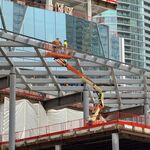Always an interesting concept for discussion. It seems that the boundaries of any such theoretical new province is pretty elastic, depending on the perspective of the poster (nobody seems to have discussed whether The Suburbs should be in or out, because it seems that some city core folks figure that their counterparts in Scarborough, North York and Etobicoke are of a different world).
To me, the border of the future Province of Toronto (or whatever it winds up being called) should be the more or less the same as the outer boundary of the Greenbelt (
https://goo.gl/images/nKAbTJ), minus northern Durham Region and the Niagara Escarpment extension up to the Bruce Peninsula. This would ensure that any development that remained in "Ontario" would be outside of these sensitive lands.
As for sub-national units (Provinces, States, etc), my personal belief is that they should be relatively economically homogeneous, and should share the same over-arching policy goals. For example, the GTA is focused mainly on financial and service sector jobs, with a little bit of manufacturing thrown in. The biggest issues are housing and transportation. For Northern Ontario, the primary focus is resource development, and just jobs in general. It's very difficult to balance both of those very different needs with the same government without someone feeling left out or getting the short end of the stick.
Canada's Provincial structure needs to be re-adapted for the 21st century. I personally lean more towards shifting more responsibility to the Federal government and less towards Provinces anyway. For example, I think Healthcare should be a Federal mandate, not a Provincial one. When you look at S.91 and 92 of the Constitution, the division made sense in the 1860s, but it doesn't make as much sense now. Healthcare was a very minor expense, and the average student only went to school until Grade 8. Now Healthcare and Education account for more than half of all Provincial expenditures, and the standards vary widely from Province to Province.
With more responsibility shifted to the Federal government, "city-state"-like entities like the provinces of Toronto, Montreal, Vancouver, and the National Capital Region could actually work (if they didn't have to deal with things like healthcare). It would allow these sub-national units to focus solely on their priorities, without having to perform a balancing act with all of the varying interests within their Province (mainly the rural vs urban divide).




